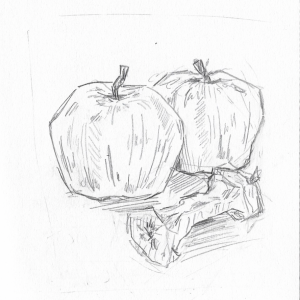A Letter to My Letter Grades: It’s Time to Go
February 28, 2019
I want you to stop for a moment and think about where you are, and more importantly, what you are doing here. Think about how often you ask questions in school. They might be silly questions about homework, or when the period ends, but they are still questions. Being inquisitive is a part of our nature as students; we understand that in order to learn, we have to ask.
I feel that the ultimate question all students should be asking themselves is: Why am I here? What is the purpose of school? The answer has been drilled and drilled into our minds. We are constantly told, from teachers and staff, that our purpose here at school is to learn—to expand our knowledge of the world and develop the life skills that will make us successful people.
If this is truly the purpose of our education, then I ask you, why is it in actuality that letter grades are designated as the foundation of our academic lives? If the way we are assessed in schools is a measure of how much we have learned, then why is my worst grade in the class that I learned the most in? It’s true.
The class that I made the most progress in, that I soaked up the most knowledge in, is damaging my GPA. The more mistakes I make, the more I learn. But, the more mistakes I make, the lower my grade becomes.
Maybe the said notion that has been forced upon us is too idealistic. Maybe, in an ideal school, the objective of true learning would be reflected in the outcomes of its students, when in reality, that is clearly not the case. If it were, my highest grade would be in the class I struggled the most in, and, inevitably, learned the most from. I didn’t struggle to learn—I struggled in order to learn. I was faced with challenges left and right, and gained so much more from that class than any other class because of them. That being said, yes, schools are successful in offering challenges, like AP classes or other thought-provoking courses, but they fall short by undermining the success of those that overcome them.
For example, when honoring a valedictorian at graduation, the school doesn’t take into account the many important factors that cause a high GPA. Perhaps the student was more STEM focused, and never took an art class out of their comfort zone because they were worried they would get an A-minus. Perhaps the student didn’t play any sports or join any clubs because they didn’t want those extra-curriculars to drop their GPA. Think of all the learning opportunities they missed, all of the experiences they failed to have.
Letter grades, by nature, don’t take into account the journey, despite its emphasis on a growth mindset. I’m sure everyone has heard the saying: “It’s not about the outcome, it’s about the journey.” The hypocrisy exerted by schools is ever so present regarding that quote. How can schools attempt to push growth mindset on their students, when they aren’t exercising it themselves? Simply, letter grades don’t reflect learning, the alleged purpose of school itself.
The real, hard truth is that grades put a damper on a student’s learning. The worry over how much a project or test is worth in the gradebook ultimately takes away from the experience of learning. If a student submits a homework assignment, or a lab report, and afterward thinks, “Gee, I hope I get a good grade on this,” it signifies that the school has failed them. The school made a promise that learning was top priority, and yet, the student’s concern was a percentage. An insignificant number or letter that was supposed to represent days or weeks or months of struggles, obstacles, and hills overcame for the purpose of learning. How in the world can one number, one letter, one figure, signify that much of a journey?
The use of the letter grade, and the false philosophy of education that backs it up, will not be easily abolished or even altered. Regardless, the first step to change is awareness. I think the best thing we can do as students is change our way of thinking. Take these ideas and form your own from them—maybe even learn.
This piece also appears in our February 2019 print edition.









